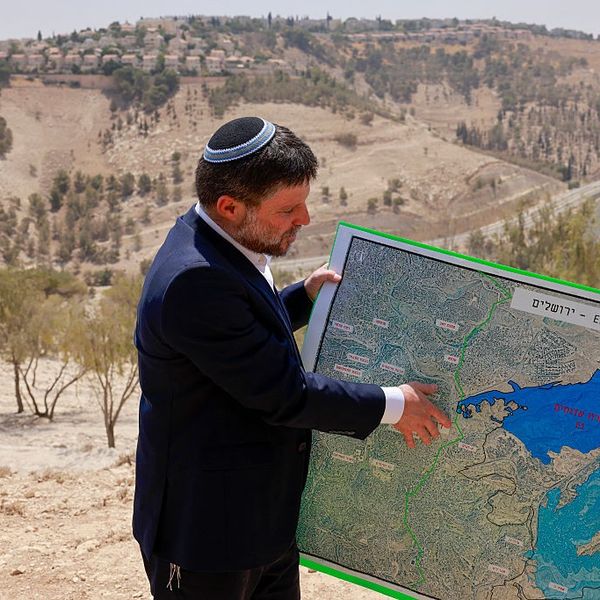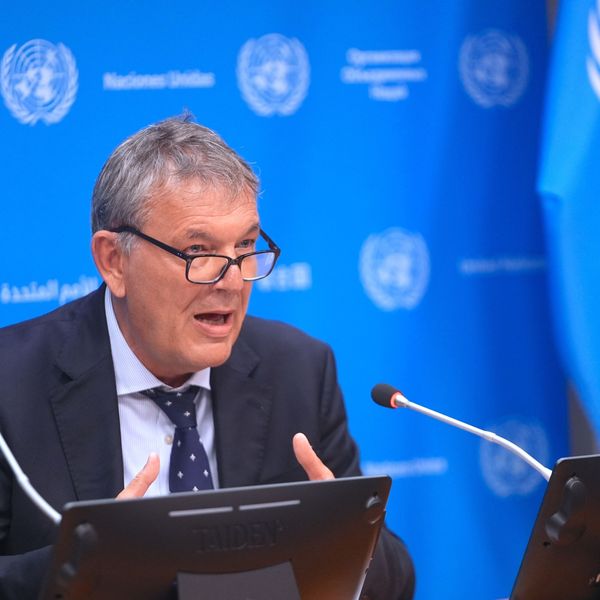UNESCO approves Palestinian membership bid
UN cultural body admits Palestine as full member despite US threat to cut off tens of millions of dollars in funding.
The UN Educational, Scientific and Cultural Organisation (UNESCO) voted on Monday to admit Palestine as a member, a move which will likely cause the US government to cut off tens of millions of dollars in annual funding.
The Palestinian bid received 107 "yes" votes during a UNESCO meeting in Paris, with 14 countries voting against and 52 abstaining, enough to satisfy a two-thirds majority of those countries present and voting.
The decision grants full membership to Palestine, which allows them to register certain sites, like the Church of the Nativity, in UNESCO's World Heritage register.
It is a small victory for the Palestine Liberation Organisation (PLO), which filed a bid last month for full membership at the United Nations. The bid has been stalled for weeks at the UN Security Council, and will likely face a US veto when it comes to a vote.
Still, the "yes" vote at UNESCO will add at least symbolic weight to the PLO's argument that the UN should recognise a Palestinian state.
"It's good news. It's another step in the right direction," said Husam Zomlot, a PLO member and former ambassador. "We're marching towards full status in the international system. UNESCO is a very important organisation."
Israel was quick to criticise the decision: Nimrod Barkan, the Israeli representative to UNESCO, called the vote "tragic for the idea of UNESCO."
A US funding cut?
Israel, not surprisingly, voted against the measure, as did the United States, Canada and several European countries, including Germany. The United Kingdom abstained, while France voted in favour.
Mouin Rabbani, an analyst at the Institute for Palestinian Studies in Amman, said the vote would nonetheless make it harder for those countries to oppose Palestinian efforts to be recognised.
"What they're doing is developing leverage over the Americans, the Europeans, the Israelis, so these parties begin to take them more seriously," Rabbani said.
The vote will almost certainly trigger a US law, passed in 1990, which bars the US from funding any United Nations agency "which accords the Palestine Liberation Organisation the same standing as member states." The US provides about $80 million per year, or 22 per cent of the agency's total budget.
David Killion, the US representative at UNESCO, said the decision would "complicate our ability to support UNESCO," and reiterated the Obama adminstration's past criticism of Palestinian bids for UN recognition.
"The only way forward to the Palestinian state we seek is through negotiations," Killion said. "We believe efforts such as what we have seen today are counterproductive."
The president can often override such laws with a so-called "national security waiver"; these waivers allow the PLO to maintain a mission in Washington, for example, despite a 1987 law barring it.
But the 1990 law on UN funding, and a similar measure passed in 1994, do not provide the option of a waiver.
Victoria Nuland, a spokeswoman for the State Department, would not say whether the US was pressuring Congress to issue such a waiver.
"We are not going to create a Palestinian state at UNESCO," Nuland said last week. "There are consequences if UNESCO votes in this direction."
The European Union tried to stop the PLO bid by offering them limited membership on UNESCO's executive committee, and funds to renovate the Church of the Nativity in Bethlehem, believed to be the birthplace of Jesus.
An Urgent Message From Our Co-Founder
Dear Common Dreams reader, The U.S. is on a fast track to authoritarianism like nothing I've ever seen. Meanwhile, corporate news outlets are utterly capitulating to Trump, twisting their coverage to avoid drawing his ire while lining up to stuff cash in his pockets. That's why I believe that Common Dreams is doing the best and most consequential reporting that we've ever done. Our small but mighty team is a progressive reporting powerhouse, covering the news every day that the corporate media never will. Our mission has always been simple: To inform. To inspire. And to ignite change for the common good. Now here's the key piece that I want all our readers to understand: None of this would be possible without your financial support. That's not just some fundraising cliche. It's the absolute and literal truth. We don't accept corporate advertising and never will. We don't have a paywall because we don't think people should be blocked from critical news based on their ability to pay. Everything we do is funded by the donations of readers like you. Will you donate now to help power the nonprofit, independent reporting of Common Dreams? Thank you for being a vital member of our community. Together, we can keep independent journalism alive when it’s needed most. - Craig Brown, Co-founder |
The UN Educational, Scientific and Cultural Organisation (UNESCO) voted on Monday to admit Palestine as a member, a move which will likely cause the US government to cut off tens of millions of dollars in annual funding.
The Palestinian bid received 107 "yes" votes during a UNESCO meeting in Paris, with 14 countries voting against and 52 abstaining, enough to satisfy a two-thirds majority of those countries present and voting.
The decision grants full membership to Palestine, which allows them to register certain sites, like the Church of the Nativity, in UNESCO's World Heritage register.
It is a small victory for the Palestine Liberation Organisation (PLO), which filed a bid last month for full membership at the United Nations. The bid has been stalled for weeks at the UN Security Council, and will likely face a US veto when it comes to a vote.
Still, the "yes" vote at UNESCO will add at least symbolic weight to the PLO's argument that the UN should recognise a Palestinian state.
"It's good news. It's another step in the right direction," said Husam Zomlot, a PLO member and former ambassador. "We're marching towards full status in the international system. UNESCO is a very important organisation."
Israel was quick to criticise the decision: Nimrod Barkan, the Israeli representative to UNESCO, called the vote "tragic for the idea of UNESCO."
A US funding cut?
Israel, not surprisingly, voted against the measure, as did the United States, Canada and several European countries, including Germany. The United Kingdom abstained, while France voted in favour.
Mouin Rabbani, an analyst at the Institute for Palestinian Studies in Amman, said the vote would nonetheless make it harder for those countries to oppose Palestinian efforts to be recognised.
"What they're doing is developing leverage over the Americans, the Europeans, the Israelis, so these parties begin to take them more seriously," Rabbani said.
The vote will almost certainly trigger a US law, passed in 1990, which bars the US from funding any United Nations agency "which accords the Palestine Liberation Organisation the same standing as member states." The US provides about $80 million per year, or 22 per cent of the agency's total budget.
David Killion, the US representative at UNESCO, said the decision would "complicate our ability to support UNESCO," and reiterated the Obama adminstration's past criticism of Palestinian bids for UN recognition.
"The only way forward to the Palestinian state we seek is through negotiations," Killion said. "We believe efforts such as what we have seen today are counterproductive."
The president can often override such laws with a so-called "national security waiver"; these waivers allow the PLO to maintain a mission in Washington, for example, despite a 1987 law barring it.
But the 1990 law on UN funding, and a similar measure passed in 1994, do not provide the option of a waiver.
Victoria Nuland, a spokeswoman for the State Department, would not say whether the US was pressuring Congress to issue such a waiver.
"We are not going to create a Palestinian state at UNESCO," Nuland said last week. "There are consequences if UNESCO votes in this direction."
The European Union tried to stop the PLO bid by offering them limited membership on UNESCO's executive committee, and funds to renovate the Church of the Nativity in Bethlehem, believed to be the birthplace of Jesus.
The UN Educational, Scientific and Cultural Organisation (UNESCO) voted on Monday to admit Palestine as a member, a move which will likely cause the US government to cut off tens of millions of dollars in annual funding.
The Palestinian bid received 107 "yes" votes during a UNESCO meeting in Paris, with 14 countries voting against and 52 abstaining, enough to satisfy a two-thirds majority of those countries present and voting.
The decision grants full membership to Palestine, which allows them to register certain sites, like the Church of the Nativity, in UNESCO's World Heritage register.
It is a small victory for the Palestine Liberation Organisation (PLO), which filed a bid last month for full membership at the United Nations. The bid has been stalled for weeks at the UN Security Council, and will likely face a US veto when it comes to a vote.
Still, the "yes" vote at UNESCO will add at least symbolic weight to the PLO's argument that the UN should recognise a Palestinian state.
"It's good news. It's another step in the right direction," said Husam Zomlot, a PLO member and former ambassador. "We're marching towards full status in the international system. UNESCO is a very important organisation."
Israel was quick to criticise the decision: Nimrod Barkan, the Israeli representative to UNESCO, called the vote "tragic for the idea of UNESCO."
A US funding cut?
Israel, not surprisingly, voted against the measure, as did the United States, Canada and several European countries, including Germany. The United Kingdom abstained, while France voted in favour.
Mouin Rabbani, an analyst at the Institute for Palestinian Studies in Amman, said the vote would nonetheless make it harder for those countries to oppose Palestinian efforts to be recognised.
"What they're doing is developing leverage over the Americans, the Europeans, the Israelis, so these parties begin to take them more seriously," Rabbani said.
The vote will almost certainly trigger a US law, passed in 1990, which bars the US from funding any United Nations agency "which accords the Palestine Liberation Organisation the same standing as member states." The US provides about $80 million per year, or 22 per cent of the agency's total budget.
David Killion, the US representative at UNESCO, said the decision would "complicate our ability to support UNESCO," and reiterated the Obama adminstration's past criticism of Palestinian bids for UN recognition.
"The only way forward to the Palestinian state we seek is through negotiations," Killion said. "We believe efforts such as what we have seen today are counterproductive."
The president can often override such laws with a so-called "national security waiver"; these waivers allow the PLO to maintain a mission in Washington, for example, despite a 1987 law barring it.
But the 1990 law on UN funding, and a similar measure passed in 1994, do not provide the option of a waiver.
Victoria Nuland, a spokeswoman for the State Department, would not say whether the US was pressuring Congress to issue such a waiver.
"We are not going to create a Palestinian state at UNESCO," Nuland said last week. "There are consequences if UNESCO votes in this direction."
The European Union tried to stop the PLO bid by offering them limited membership on UNESCO's executive committee, and funds to renovate the Church of the Nativity in Bethlehem, believed to be the birthplace of Jesus.

